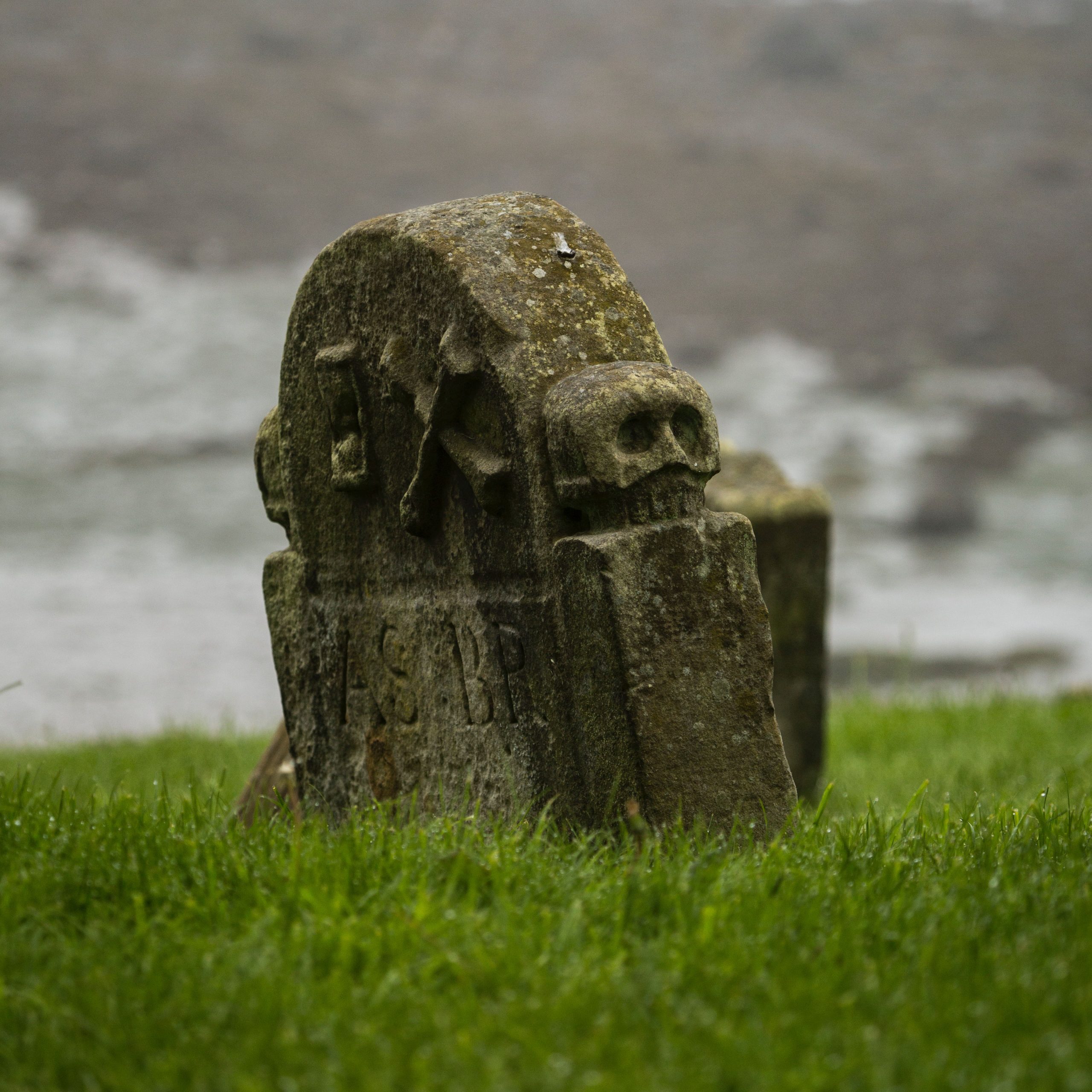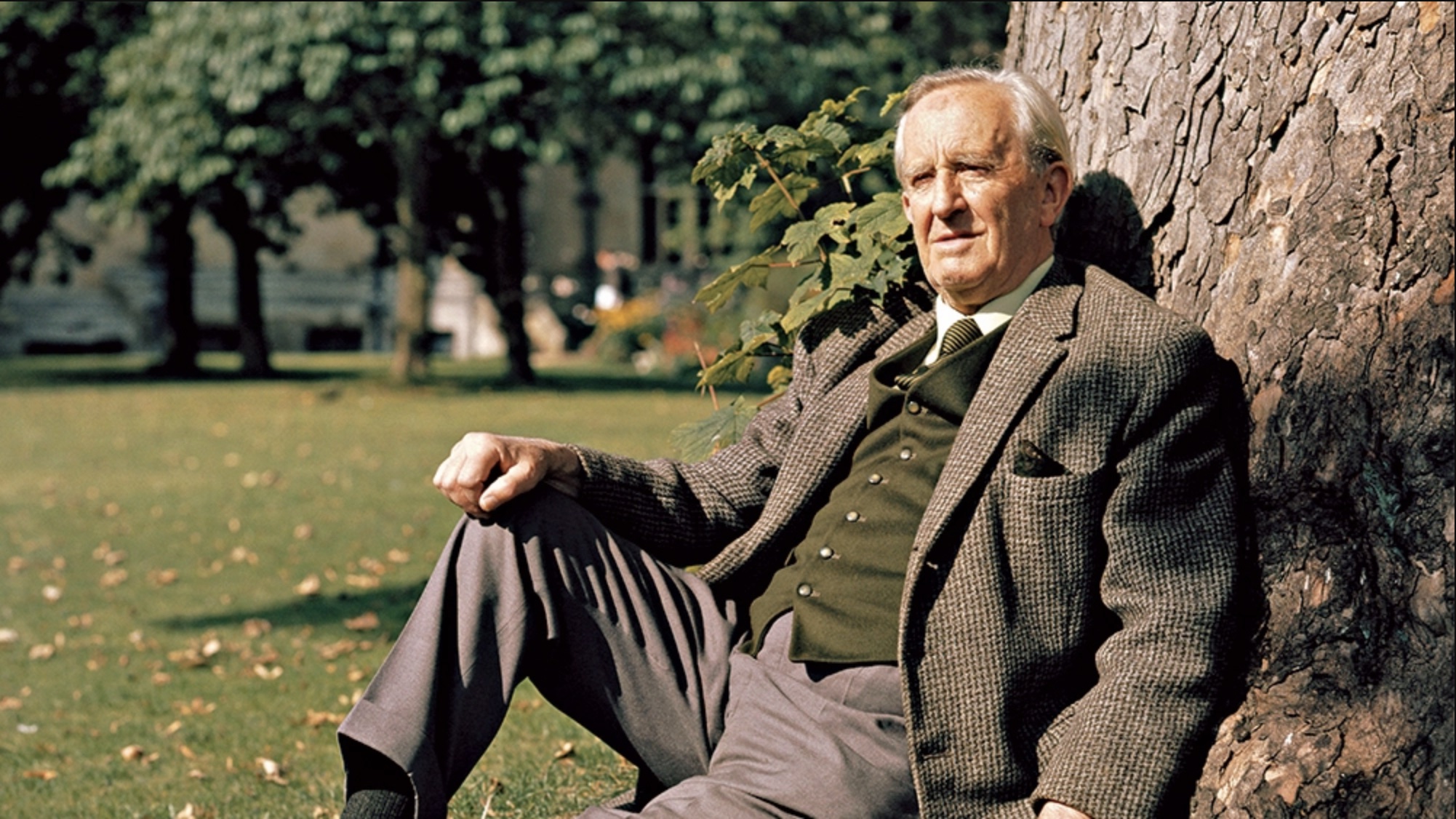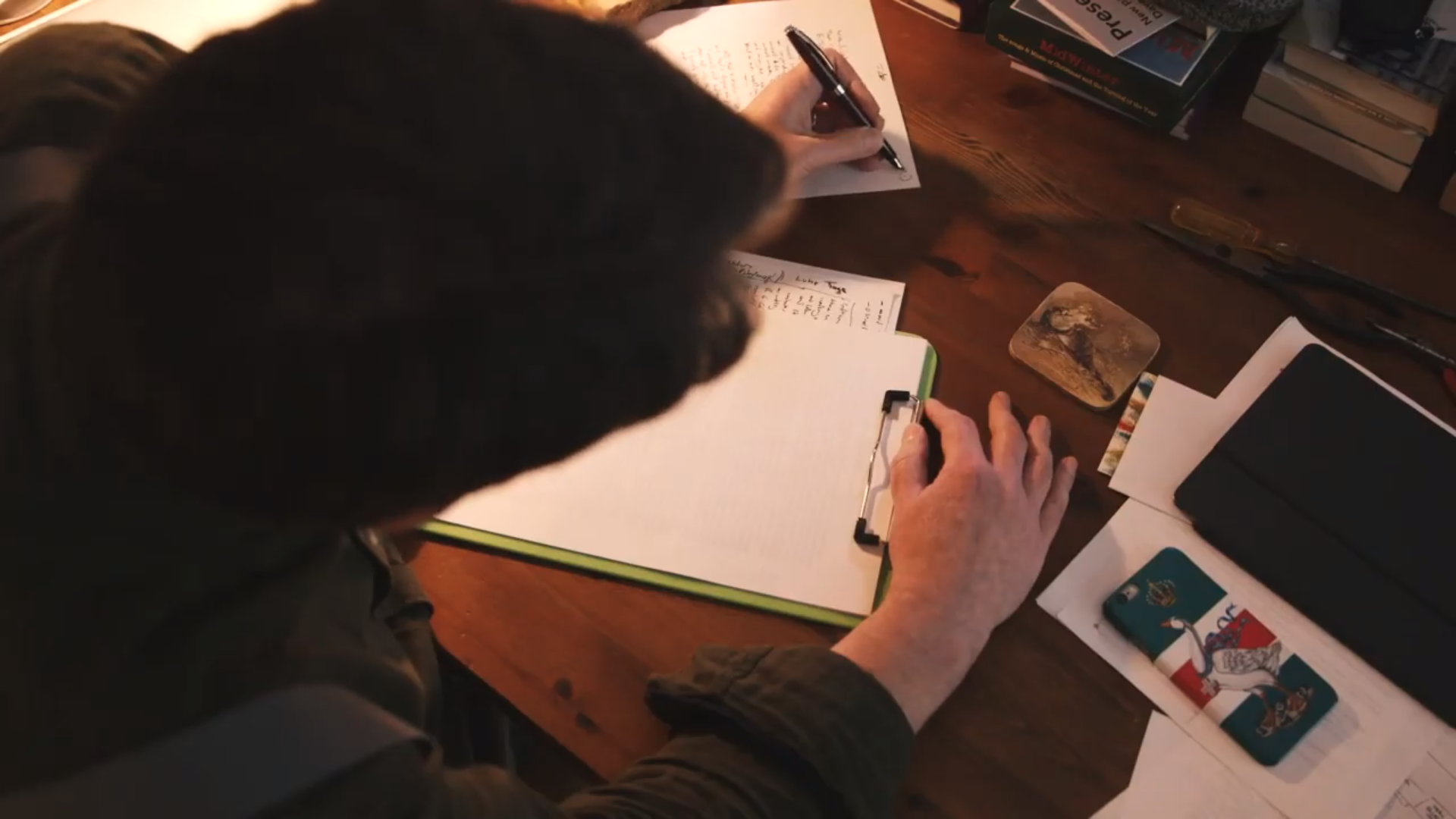
Having succeeded in destroying the One Ring, Sam and Frodo are rescued from the slopes of Mount Doom and carried to Ithilien. Sam awakes in a scene that takes place in the chapter ‘The Field of Cormallen’.
When Sam awoke, he found that he was lying on some soft bed, but over him gently swayed wide beechen boughs, and through their young leaves sunlight glimmered, green and gold. All the air was full of a sweet mingled scent.
He remembered that smell: the fragrance of Ithilien. ‘Bless me!’ he mused. ‘How long have I been asleep?’ For the scent had borne him back to the day when he had lit his little fire under the sunny bank; and for a moment all else between was out of waking memory. He stretched and drew a deep breath. ‘Why, what a dream I’ve had!’ he muttered. ‘I am glad to wake!’ He sat up and then he saw that Frodo was lying beside him, and slept peacefully, one hand behind his head, and the other resting upon the coverlet. It was the right hand, and the third finger was missing.
Full memory flooded back, and Sam cried aloud: ‘It wasn’t a dream! Then where are we?’
And a voice spoke softly behind: ‘In the land of Ithilien, and in the keeping of the King; and he awaits you.’ With that Gandalf stood before him, robed in white, his beard now gleaming like pure snow in the twinkling of the leafy sunlight. ‘Well, Master Samwise, how do you feel?’ he said.
But Sam lay back, and stared with open mouth, and for a moment, between bewilderment and great joy, he could not answer. At last he gasped: ‘Gandalf! I thought you were dead! But then I thought I was dead myself. Is everything sad going to come untrue? What’s happened to the world?’
‘A great Shadow has departed,’ said Gandalf, and then he laughed and the sound was like music, or like water in a parched land; and as he listened the thought came to Sam that he had not heard laughter, the pure sound of merriment, for days upon days without count. It fell upon his ears like the echo of all the joys he had ever known. But he himself burst into tears.
This is one of my favourite passages in all of Tolkien’s work, and these paragraphs encapsulate some of the best things in Middle-earth. The gentle reassurance of Gandalf’s presence, the beauty of the natural world, the simple honesty of Samwise Gamgee and Tolkien’s sublime use of the English language.
For Tolkien the eucatastrophe is not as simple as a happy ending. He describes the joy it is intended to deliver as being ‘poignant as grief.’ Neither does it deny ‘dyscatasrophe … sorrow and failure: the possibility of these is necessary to the joy of deliverance.’
Dyscatastrophe is an essential part of Tolkien’s writing. Readers are often divided on whether Tolkien’s vision of the world was fundamentally optimistic or pessimistic. Loss and death are central themes in his work and this perhaps has some autobiographical basis. Tolkien himself was orphaned by the age of 12 and lost a significant number of close childhood friends in the Battle of the Somme.
On the Field of Cormallen, a Great Shadow has indeed departed from the world. Sauron is defeated, and Gandalf has even has returned from death. Sam’s question, ‘is everything sad going to come untrue?’ is often used by Christians as a kind of apologetic for what life will be like in the age to come. I believe Tolkien’s answer is a complex mix of yes and no, and perhaps this is why he frames it as a question. As Sam looks to his master, peacefully asleep, he notices the finger that is missing. There are some things that are lost forever, and evil leaves its mark.
Readers are often divided on whether Tolkien’s vision of the world was fundamentally optimistic or pessimistic.
The doom of Frodo Baggins is the prime example of this. Though successful in his quest, the wounds of that journey; the Witch-King’s knife on Weathertop and Shelob’s sting in Cirith Ungol, cannot be healed in this world. ‘We set out to save the Shire,’ he tells Sam, ‘and it has been saved – but not for me.’ The destruction of evil also comes at the cost of Gollum’s redemption, one of the greatest causes for hope throughout the story. Arwen’s marriage to Aragorn is an occasion of some joy that will be for the enriching and enoblement of the whole world. But it comes at a cost; one day, she will die.
The Lord of the Rings and The Hobbit are comparatively cheery compared to much of his other work. Tolkien famously abandoned a sequel called ‘The Return of Shadow’ because it was too depressing even for him. Those of you who have read The Silmarillion, which was published by Tolkien’s son Christopher after his death will know from those mythic tales that Tolkien’s world is filled with enormously sorrowful and permanent loss. Beren and Lúthien, itself a very sad story primarily concerned with love and mortality is comfortably uplifting compared to the tales that frame it, in which the forces of evil seem to be inexorably stronger than those of good. The Battle of Unnumbered Tears, The Fall of Gondolin, The Tragedy of Túrin Turambar. There’s a story where a spider attacks two trees; it lasts for about a page and it is genuinely one of the saddest things I’ve ever read.
This sense of loss is perhaps a reflection of Tolkien’s own familiarity with death, and his particularly premodern Catholic faith, which itself mourns the loss of an Old World and worships a saviour who, though fully glorified, still bears His wounds. Tolkien states that eucatastrophe ‘denies … universal, final defeat’, but admits that it does so ‘in the face of much evidence.’ Is there a better description of what discipleship of Christ should represent?
I’ve felt myself growing closer to what Tolkien describes – a continual denial of universal final defeat in spite of all that we read of in history and continue to see around us.
I have spent most of my life in a very respectable, modern, evangelical protestant church tradition. There are a significant number of Tolkien fans in this sphere, perhaps a surprising number given his status as a Catholic and a general distrust of all things Roman (spoken or otherwise) amongst English protestants. I was encouraged within this tradition to believe that there is tonnes of very credible evidence to be a Christian; that in a Holmesian sense I only needed to remove the impossible to discover the risen Christ; the final remaining option. Over time, and as I’ve seen more of just what the world is capable of inflicting, I’ve felt myself growing closer to what Tolkien describes – a continual denial of universal final defeat in spite of all that we read of in history and continue to see around us.
This is different to the certainty of the blind optimism that ‘everything will all be fine in the end’, but is also different from the certainty of that very orderly and rational basis for faith that was once my own. Both represent a kind of despair – a surrendering to something because it is the only option. Tolkien’s faith and the work it fuelled communicates something far less coercive, yet full of grace even in the midst of devastating sorrow.
The Lord of the Rings isn’t really an apologetic for anything – Tolkien left the proselytising to his close friend CS Lewis. Nevertheless, the beauty, goodness and truth of his work have been profoundly compelling for me during a dark and difficult couple of years. They have certainly contributed to a renewal and refreshment in my faith. Tolkien’s treatment of the dyscatastrophic has played an enormous role in that.
In the margin of a small notebook I have scrawled the lines ‘nice puritan-ness is confused as Christianity. We prefer a G-rated lie to an R-rated truth.’ There isn’t any reference for who said this (although they are clearly Americans), but I think it rings true as a conclusion here. So much of Christian cultural output is depressingly safe and upbeat when compared to a scriptural tradition and a real world that are profoundly messy, equivocal and riddled with dyscatastrophe. The eucatastrophe doesn’t deny the reality of sorrow and failure, nor does it swoop in all deus ex machina and just fix everything. The beautiful disaster doesn’t abolish the catastrophe but redeems it, incorporating even its most discordant notes into a greater music. In this, Tolkien claims one can glimpse the ‘far-off gleam of echo of evangelium in the real world.’





























 Just over a year ago,
Just over a year ago, 
 Did I say mix CD? Well, if you, like me, partake in the creation of such things for holiday jaunts to see family or just to compile favourite tunes of the year, this is a shoe in. Jo has never sounded more vital and arresting. Just listen to the intro and it will come as no surprise that this is the lady whose brutal strumming was responsible for slicing the top off one of her fingers while performing earlier this year. Hardcore!
Did I say mix CD? Well, if you, like me, partake in the creation of such things for holiday jaunts to see family or just to compile favourite tunes of the year, this is a shoe in. Jo has never sounded more vital and arresting. Just listen to the intro and it will come as no surprise that this is the lady whose brutal strumming was responsible for slicing the top off one of her fingers while performing earlier this year. Hardcore! In september, Ben’s bike got nicked, so to fund a new one (and his upcoming volunteer work in Tanzania) he has started doing pencil sketches of basically anything you’d like. Rather geekily, we got him to make a piece of GK Chesterton. My mum got him to draw my sister’s dogs (yes, he really will stoop that low). They range from £30 (A5) to £40 (A3) and you won’t be disappointed.
In september, Ben’s bike got nicked, so to fund a new one (and his upcoming volunteer work in Tanzania) he has started doing pencil sketches of basically anything you’d like. Rather geekily, we got him to make a piece of GK Chesterton. My mum got him to draw my sister’s dogs (yes, he really will stoop that low). They range from £30 (A5) to £40 (A3) and you won’t be disappointed.

